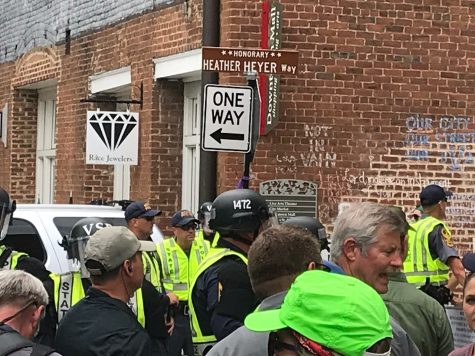In Wake of a Tragedy
Charlottesville and Decatur respond to the anniversary of the controversial ‘Unite The Right’ protest
On Aug. 12, 2018, only a few passersby could be seen as news and police helicopters flew overhead, mingling with the dark clouds. A State of Emergency was enacted in Charlottesville, Virginia to prevent another tragedy like the one that occurred the year before at a rally when Anti-Protesters clashed with White Nationalists and Neo-Nazis.
The 2017 rally protested the removal of the Robert E. Lee Confederate monument but escalated into an ordeal that left many injured and three dead, two police officers and one counter-protester.
Heather Heyer, a counter-protester that was run over and killed, is now honored by having the name of the now-historic section of the downtown mall (Fourth Street) dedicated to her.

James Alex Fields, a man from Maumee, Ohio, drove through Heyer along with other counter-protesters and was charged for second-degree murder. The reasons for arrest also include failing to stop at the scene of a crash and malicious wounding (three counts).
According to Independent, in addition to killing Heyer with his car, Fields also brought white supremacist memorabilia to the rally and was charged with 28 counts of hate crime.
“Unfortunately, we’re still at such a racial divide that it took a white girl dying for white people to wake up and pay attention,” Heyer’s mother, Susan Bro, told USA Today. “[People of color] have been fighting this fight for many years—this is not news to them.”
Local Charlottesville residents Karen Moran and Wistar Morris also believe the Unite The Right protests greatly affected their city. Both have a strong connection to their town and are saddened by the violence has enveloped it. Although neither was present the day of the original Unite The Right protest, they still felt the effects of the aftermath of the event.
“We came back and my office is literally across the street on Fourth Street where the attack was,” Morris said. “These white neo-Nazis had invaded our town to spew their hate and violence against the people of Charlottesville.”
Moran has a similar stance and remembers that “it was an odd feeling, quite jarring” to come home to such a tragedy.
“It hurt that our town, which we always thought was tolerant, inclusive and progressive…had been the unlucky victim of all of these heinous people from outside,” Morris said.
One of the people Morris and Moran consider “heinous” is Jason Kessler, the organizer of the “Unite The Right” rally.
“Kesler lives here and keeps constantly… causing us to take action against him, bringing about controversy,” Moran said.
A year later, Charlottesville continued to feel the loss of Heyer as the city braced for possible violence.
Charlottesville Law Enforcement was on guard all over the city. Those stationed at Heather Heyer Way, the place where conflict originally occurred, had on riot gear including masks and shields.
The event resulted in physical altercations that led to four arrests according to WJLA, including obstruction of free passage, disorderly conduct, assault and battery and possession of a concealed weapon.
The violations occurred approximately during the hours of 11:00 am and 2:00 pm on the anniversary of the 2017 protests.
The heavy police presence was partially due to the backlash about how police handled the situation the year prior during the original event. According to Richmond, police are under fire for their response to the Unite the Right protest being too “mild” compared to their “overly aggressive” response to a Ku Klux Klan rally earlier in that year.
At the KKK rally, a path of riot gear-clad officers separated many anti-racist protesters that didn’t agree with the clan. In total, 22 arrests took place. In addition, police used tear gas to disperse the protesters and anti-protesters, which led one man to file a lawsuit against the police.
Jalane Schmidt, an activist who attended the KKK rally, was incredibly angered by the authorities’ assessment and response to the situation.
“[This militarization of the police] has to stop,” Schmidt told Richmond. “When there’s militarization, the inevitable result is violence. To a hammer, everything’s a nail.”
This could have influenced the police interference at the Unite The Right protest, which was unable to prevent the abundance of violence that ensued.
Charlottesville isn’t the only city struck by the last year’s protest clash. Decatur also held a vigil on August 12th to honor Heyer, and more than 50 Decatur citizens gathered to participate in the candlelight gathering.
Decaturish writes that the vigil wasn’t just in remembrance, “but also a ‘call to action’ to battle racism,” Martha Shockey, an Indivisible Georgia Representative, said. Although the event only lasted for 30 minutes, the people who attended created a meaningful experience by getting to know each other and by having a few minutes of silence for those lost or who are struggling.
Activist organizations who attended and organized the event include Hate Free Decatur, Indivisible Georgia, Black Lives Matter Decatur and the Beacon Black Alliance For Human Rights.
Charlottesville and Decatur may be far apart in distance, but both cities have been affected by the fatal protest clash of August 2017 and could be effected again in August 2019.
“If we are silent, then we are complicit,” Stockey told Decaturish.
Photos and videos by Sydney Fessenden.











